Hard Water vs. Soft Water: How It Affects Cleaning and How to Adapt with ECOS
5 minute read
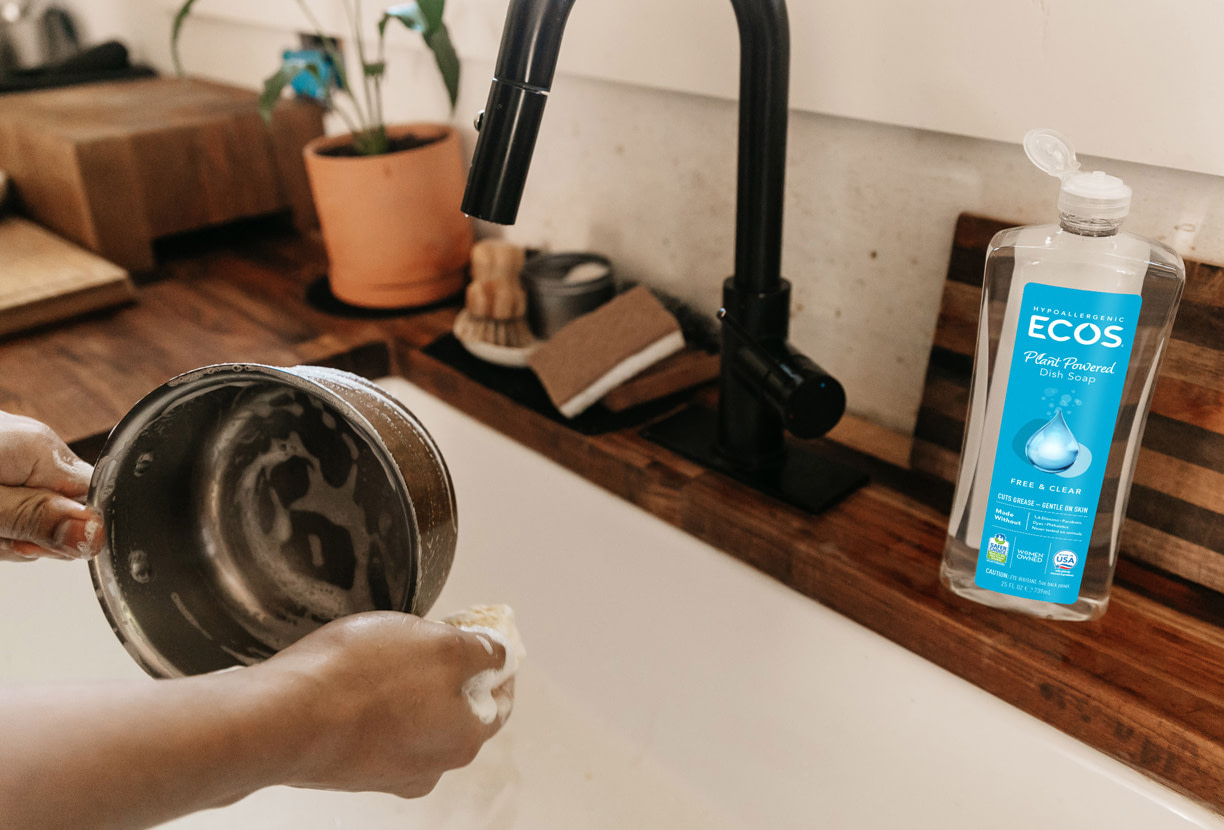
In the world of mindful cleaning, it’s not only about the product we use, but also the type of water we use with it. Although water may look the same everywhere, its composition can vary significantly, and that has a direct impact on cleaning performance.
At ECOS, we understand that effective cleaning depends not only on the product you use, but also on the type of water in your home. If you want to learn how hard or soft water affects cleaning—especially if you’re committed to a more conscious lifestyle—keep reading.
What Is Hard Water and Soft Water?
- Hard water contains a higher concentration of minerals such as calcium and magnesium. These minerals can interfere with how cleaning products work, leaving visible residue and affecting wash performance
- Soft water, on the other hand, has lower levels of these minerals. However, it’s important to distinguish between water that is naturally soft—meaning it has low levels of minerals and dissolved solids in the incoming supply—and water that has been softened through a home treatment system.
These systems typically work by exchanging calcium and magnesium ions with sodium ions, which reduces the overall hardness of the water.
This difference can affect how cleaning products interact with surfaces and appliances, as well as the types of residues they may leave behind.
Effects of Hard Water on Cleaning
Water with high mineral content can make it harder to dissolve certain residues.
It may also leave visible marks on surfaces like glass or stainless steel and contribute to buildup in appliances and pipes. In some cases, it may require more product or effort to achieve the same results, since hard water ions interfere with the cleaning action of surfactants.
Why does this happen?
One aspect of the chemistry behind hard water involves ions such as calcium and magnesium. When these ions combine with cleaning agents and soaps, they form water-insoluble compounds that are difficult to clean and remove.
These compounds often appear as white, chalky residues around faucets and bath/shower fixtures, and are especially noticeable on reflective surfaces like chrome and tile, which are commonly found in homes—particularly in bathrooms and kitchens.
Effects of Soft Water on Cleaning
Water with low mineral content tends to make it easier to dissolve residues and allows cleaning products to spread more evenly. This can lead to more efficient cleaning and reduced product usage. It also helps prevent marks and unwanted buildup.
Tips for Cleaning with Hard Water
If you live in an area with hard water, here are some recommendations to improve your cleaning results:
- Pre-treat surfaces: Some products, such as vinegar and, in certain cases, acidic solutions like lemon juice, can help break down hard water deposits before cleaning. You can also start by using a multi-purpose ECOS cleaner to remove mineral buildup before applying other products.
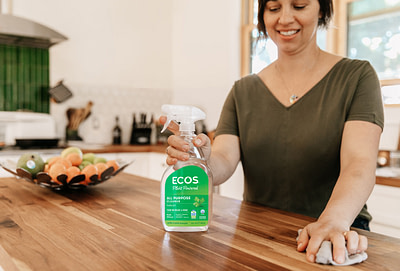
- Slightly increase the amount: In the washing machine or dishwasher, you can use a small additional amount of ECOS detergent to offset mineral interference
- Rinse with warm water: This helps dissolve residues more effectively and reduces spotting. However, in cases of very hard water, it’s recommended to install a home water softening or filtration system. Extended use of hard water in household plumbing can also reduce water flow over time, as deposits build up inside the pipes and begin to restrict water movement
- Clean appliances regularly: Refer to the manufacturer’s instructions to ensure each appliance is cleaned properly. There are specific products available to help keep your washing machine and dishwasher free from scale buildup.
What Does This Mean for ECOS Products?
Our products are designed to perform effectively under a wide range of water conditions.
However, knowing the type of water in your area can help you optimize their use. For example:
- In areas with hard water, it may be helpful to use a bit more product or choose formulas that help reduce mineral residue.
- In areas with soft water, you may find that you need less product to achieve the same results.
Environmental Benefits of Adjusting Your Cleaning Routine
Adapting your cleaning routine to your water type not only improves results—it also offers environmental advantages:
- Less product waste: Using the right amount helps reduce excess ingredients in wastewater
- Longer appliance lifespan: Reducing mineral buildup helps extend the life of your appliances
- Lower energy use: More efficient cleaning requires fewer cycles and less hot water.
ECOS Cleaning Plan for the Whole Home
Here’s a practical guide to using ECOS products based on task type and considering hard water:
🧺 Laundry
- Recommended product: ECOS Hypoallergenic Laundry Detergent with Enzymes for all fabrics.
Tip: Add a little extra if you notice residue or stiffness in clothes. Wash with warm water to improve dissolution.
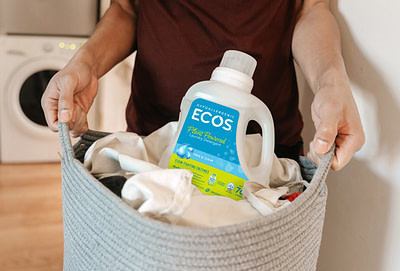
🍽️ Dishwasher
- Recommended product: ECOS Dishwasher Gel + ECOS Rinse Aid
Tip: Clean the filter regularly and use rinse aid to help reduce spotting on glassware. - Recommended product: ECOS Foaming Dish Soap
Tip: It contains an effective water softener (chelating agent) that helps address hard water deposits.
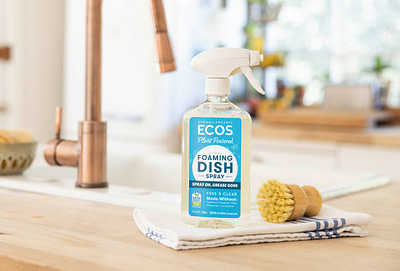
🧽 Multi-Surface Cleaning
- Recommended product: ECOS All-Purpose Cleaner with several plant-based ingredients
Tip: Ideal for bathrooms and kitchens where hard water leaves residue. Spray, let sit briefly, and rinse. - Recommended product: ECOS Window Cleaner
Tip: Ideal for windows, glass, and mirrors because it contains vinegar, and its acidic pH makes it effective against marks left by hard water deposits.
🛁 Bathrooms and Showers
- Recommended product: ECOS Bathroom Cleaner
Tip: Use weekly to help prevent mineral buildup on faucets and shower doors.
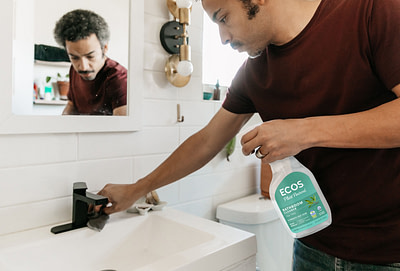
🧴 Delicate Laundry
- Recommended product: ECOS Laundry Detergent Ultra-Concentrated
Tip: Wash with cold or warm water and avoid fabric softeners if your water is very hard.
Conclusion
Understanding the type of water in your home helps you get the most out of ECOS products while caring for your surroundings and well-being. Adjusting your routine not only improves cleaning—it also strengthens your commitment to a more thoughtful and sustainable lifestyle.
Knowing the difference between hard and soft water helps you make more informed decisions about how to clean efficiently and responsibly. At ECOS, we’re committed to offering solutions that work well in any environment, helping you care for your home and the world around you.
